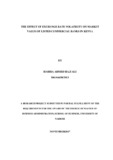| dc.description.abstract | The theoretical and empirical relationship between market value and exchange rates has
been debated for many years. Although scholars and practitioners have studied the
subject extensively, the effects of monetary developments on stock markets are not
completely understood. It has been argued that a change in capitalization could change
exchange rates or a change in exchange rates could change capitalization. The study
sought to determine the effect of exchange rate volatility on market value of listed
commercial banks in Kenya. This study was guided on purchasing Power Parity (PPP),
the comparative advantage theory, and the arbitrage-pricing theory.The study used a
descriptive research. The study population was all the listed banks in NSE, eleven of
them. Secondary datamarket value from financial statements of listed commercial banks
in Kenya was collected. The study collected secondary data for the last five years starting
year ist January 2012 to 31st December 2016 from the monthly reports remitted to the
Central Bank of Kenya available on the CBK website and Central Bank of Kenya
Resource Centre. The study conducted a regression analysis to establish the extent of
relationship between volatility in exchange rate and market value. The study also
concluded that there was positive correlation between the variables total market
capitalization and monthly exchange rate volatility. The independent and control
variables were found to be statistically significant determinants of market capitalization
of commercial banks listed at the Nairobi Securities Exchange. In this study, a conclusion
was drawn that exchange rate volatility is a major determinant of the market
capitalization at the commercial banks listed at the Nairobi Securities Exchange. The
study recommends that the management of the firms should implement policies on
growth of the market value of the firm during the periods of high exchange rate to enjoy
the benefits that come with such seasons. This study also recommends that the Central
Bank of Kenya (CBK) and other regulators should plan and influence the macroeconomic
variables such as money supply. For instance, the economy should have
sufficient money supply to ensure that there is enough money to conduct trade in the
economy | en_US |



